Massive People
MASSIVE PEOPLE(7): Derek White
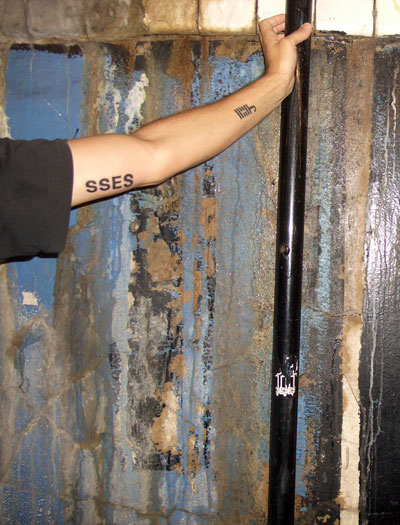 I’ve never actually met Derek White in person, but I have read a few issues of sleepingfish and I’ve got a small stack of Calamari books next to my ugly reading chair that need to be read. I did email him once to buy a few books from him this summer right before he moved out of the country. I also emailed him to say that I had liked the novel excerpt he had sent to Phoebe (we had finalized our Fall 2008 issue, my last issue as Fiction Editor, and so I was absentmindedly shuffling through our drawer of submissions and recognized his name and read the thing – had I been around for another issue, it would have been cool to publish). The novel in question? Marsupial. Now Derek lives in Narobi, Kenya with his wife, Jess. The following are some questions I emailed him, and he was kind enough to take some time to respond. Thanks, Derek.
I’ve never actually met Derek White in person, but I have read a few issues of sleepingfish and I’ve got a small stack of Calamari books next to my ugly reading chair that need to be read. I did email him once to buy a few books from him this summer right before he moved out of the country. I also emailed him to say that I had liked the novel excerpt he had sent to Phoebe (we had finalized our Fall 2008 issue, my last issue as Fiction Editor, and so I was absentmindedly shuffling through our drawer of submissions and recognized his name and read the thing – had I been around for another issue, it would have been cool to publish). The novel in question? Marsupial. Now Derek lives in Narobi, Kenya with his wife, Jess. The following are some questions I emailed him, and he was kind enough to take some time to respond. Thanks, Derek.
1) In July, you posted at 5cense a 10 day countdown to your move to Narobi. I thought that your paragraph on ‘space’ was really interesting. You wrote, “I’m more about adapting to or exploring public space, not creating my own personal space. Jess is too. Adaptation is key, as is yearning for a new backdrop.” Based on what I’ve read on your various blogs, it looks like you’ve adapted well to the public spaces of Narobi. I’m curious though, could you share a little bit about your personal space? Any photos? Journal entries? Thoughts?
Funny you should ask. When I received this I was posting a piece about just this topic.
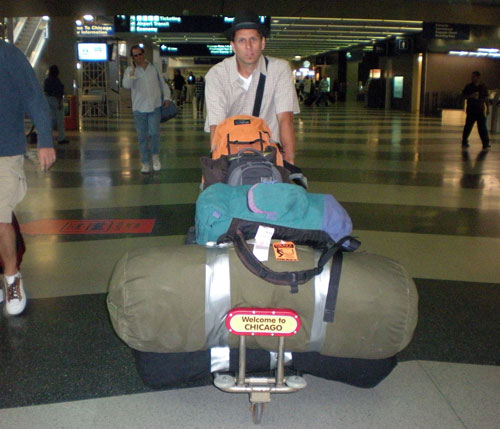 [Derek’s blog post is long, but well worth the read]
[Derek’s blog post is long, but well worth the read]
2) Having left the print remains of Calamari in Michigan with Peter Markus, you shifted publication of sleepingfish to an online format. What have you found different or exciting about that shift? And what do you miss about print, about holding sleepingfish in your hand?
“Print remains.” I like that. I’m picturing carcasses collected in brother Markus’ fruit cellar (where the books are literally living). I miss book objects. That was the biggest sacrifice I had to make moving here. But as far as literary journals, even before I moved here I considered putting Sleepingfish online. It’s cheaper and more timely, and gives more visibility to the writers, which in the end is probably the most important thing about lit mags is showcasing people’s works. You also have more flexibility with formatting online, not that I have taken advantage of that flexibility yet, but you have less constraints on posting color art, videos, sound, longer pieces, etc. And rather than have an “issue,” I like the idea of being able to post pieces on a revolving and evolving basis. It’s also a more environmentally sound model, no paper, no postage, and none of the consequences that come with it. It’s a cleaner more efficient way of doing things, but yes, nothing beats the feel and smell of paper.
3) One of your recent posts at Jess’ food blog was about people eating dirt, your making tandoori chicken over a grill, and your cooking njahi beans, which, if cooked improperly, can be poisonous. I guess I’m interested to hear how your consumption of food has changed? I imagine Jess’ work has been pretty important to your understanding of the global food crisis, but how different is it now that you’ve moved to Kenya? What are the sorts of things you see during the day regarding food and eating?
If I said giving up printing books was the biggest sacrifice, I take that back. Giving up the food options available to us in NYC was the biggest sacrifice. I’d die for a real taco right now, or sashimi, or for the olives or cheese selection at Fairway. I’d even “kill Flipper for a tuna sandwich.” But yes, like giving up print for web, one must also think more practically about the implications of what you eat. You can get some of the foods we’re used to here (like pecorino romano) but you do so at a price, both financially and morally. There is one small little “organic” place here that supports local farmers that we try to support when possible, but their offerings are limited. The likes of Tao Lin would not do well here. And for my tastes, morals aside, there is just little to desire in the food here. But yes, this is what my wife Jessica works on, so we spend a lot of time thinking about food and it’s implications. One of these days I’m going to post a “manifesto” on these thinkings around “Slow Food” as applied to book publishing. Stay tuned for that.
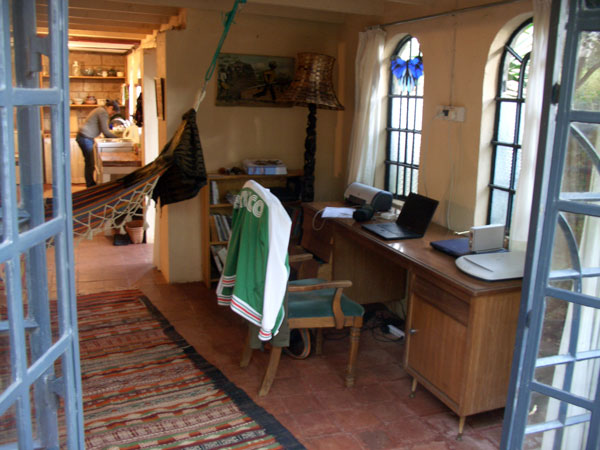
4) Have you been able to write since the move? What are you working on now and do you feel as though this new place is affecting that writing? Or is the old place still there?
I haven’t really written anything since being here. Unless you count blogging. But I don’t think of blogging as writing. It’s more like sketching. Maybe all this blogging is a study for something, who knows. Naturally people ask me this, someone asked me just yesterday, if Nairobi was inspiring a book in me. The answer is “um, no.” At least not thinking about it from here. I was the same way about New York though. I don’t think I’ve written anything that takes place in NYC, not to say I won’t some day, but it takes stepping away from it, letting it age and considering what sticks with you before putting pen to paper. I definitely don’t want to be one of those types that gets swept up in the moment, and starts a novel with “I had a farm in Africa…”. That’s the other thing, more white people are writing books about Africa than real Africans. I’d rather read the real deal. I have some old manuscripts with me that I was hoping to revive in some way. One of them takes place mostly in South America and Antarctica. Another takes place mostly in Mexico. Another takes place in South Dakota. I think South Dakota is the only place I’ve ever lived where I wanted to write about it while I was living there, but I think that’s because I was naïve. I’ve also been working on this collection of stories that I call Natural Histories, that aren’t even about people or places so much as animals. I suppose Kenya would be a good place to work on that. I just need to get off my ass.
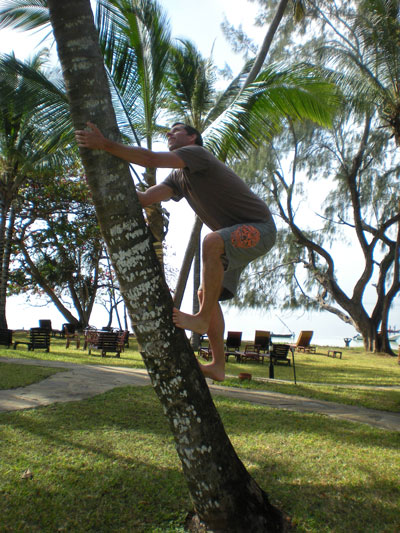 5) And this last one from Blake: “Your novel Marsupial contains crawdads, film sets, awkward translations, and brothers with morphing names. It is also based on a book that you wrote years ago and then rewrote and hybridized. What was different about what you were eating during the writing of the original text as opposed to what you were writing when you went back? How did it feel?”
5) And this last one from Blake: “Your novel Marsupial contains crawdads, film sets, awkward translations, and brothers with morphing names. It is also based on a book that you wrote years ago and then rewrote and hybridized. What was different about what you were eating during the writing of the original text as opposed to what you were writing when you went back? How did it feel?”
Hmmm, I wrote the original Marsupial (then known as, Our Mother the Fish) in Savannah, GA. I’m not sure what I was eating at the time. When I think back to that time I can smell and taste Gatorade and cajun trail mix (the shitty kind with MSG). I was working as a land surveyor so used to thrash about all day in swamps or sit on GPS points in the summer heat and humidity of Georgia. I’d drink like a dozen liters of gatorade a day. And lunch would be cajun trail mix or potato chips or some other junk food. I actually first started sketching Marsupial in Nice, France, where I was on some film set with Kraft catered food that was all disgustingly creamy and cheesy and we drank a lot of wine and esspresso, and I felt probably the most unhealthy I’ve ever felt in my life. I think some of that comes through in the book. The scene where Stu hallucinates on moldy cheese was for real. When I revisited it I was in NYC, eating like a chief. In the process of “doing research” (to truly understand something you should eat it) we barbecued monkfish on our roof a few times. We ate a lot of sushi. It’s making me hungry thinking about it.
6) Anything else you want to talk about?
I think Jello Biafra is the coolest name ever and accurately depicts how I’m feeling at this moment.
That’s all, HTMLGIANT readers. If you don’t already, read Derek’s blog. He has some wonderful pics up (I copied all of these from various posts), and he puts a lot of time into his posts; I enjoy reading his thoughts on Narobi, the books he’s reading, food he eats, and other things. Thanks again, Derek for the interview.
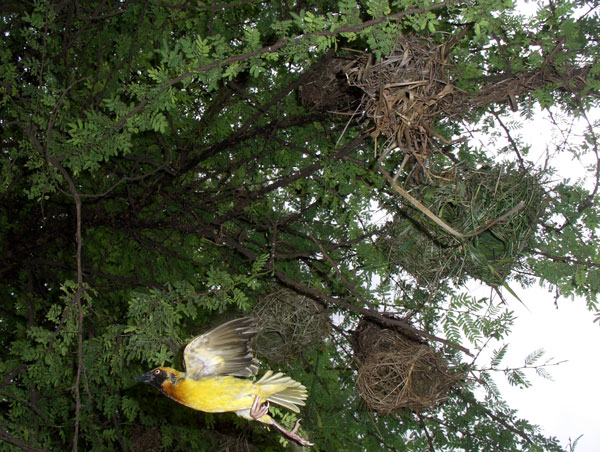
Tags: Calamari, derek white, Kenya, sleepingfish

Nice!
Good stuff. I’m loving these massive people posts.
Good stuff. I’m loving these massive people posts.
Derek is also a fine artist and designer!
Derek is also a fine artist and designer!
“One of these days I’m going to post a “manifesto” on these thinkings around “Slow Food” as applied to book publishing. Stay tuned for that.”
see Dale Smith’s nascent Slow Poetry Movement…
http://possumego.blogspot.com/2008/06/slow-poetry.html
“One of these days I’m going to post a “manifesto” on these thinkings around “Slow Food” as applied to book publishing. Stay tuned for that.”
see Dale Smith’s nascent Slow Poetry Movement…
http://possumego.blogspot.com/2008/06/slow-poetry.html
Derek is the Bill Blake of the 21st Century.
Derek is the Bill Blake of the 21st Century.
thanks all, thanks Ryan for the interview. And thanks John for pointed out the possum’s slo po manifresto. I guess I’m thinking more on a nitty gritty level, not in such a high-brow poetic sense. I wrote down some thoughts last year on the subject:
http://5cense.com/Economy_of_Words_2007.htm
Though I probably bash on SPD some. It’s good to see someone from SPD engaged with the writing community, as I see distribution as a critical component to all this. When I was living in NYC, I was probably a little more idealistic about things, thinking all you needed was a laptop and a bicycle to shuttle around to bookstores, but living abroad makes you realize that (just like in the food industry), not all writers come from urban centers and not all book-buyers come from urban centers, and SPD has made this a hell of a lot easier (now if we only figure out how SPD can pay me!?). Dale is talking more on a ideological level on how to disrupt thought or the status quo, etc. I’m simply thinking about books, books as art, books as objects, books as sustenance, just as a foodie thinks of food, not only from how it tastes, but what it went through to get to them. Going to the Slow Food meetings in Italy was inspiring to me on this level, to see farmers and foodies form all over the world connecting on such a level, it would be great to see a similar thing with bookmakers and booklovers, AND the distribution chain that connects them…
thanks all, thanks Ryan for the interview. And thanks John for pointed out the possum’s slo po manifresto. I guess I’m thinking more on a nitty gritty level, not in such a high-brow poetic sense. I wrote down some thoughts last year on the subject:
http://5cense.com/Economy_of_Words_2007.htm
Though I probably bash on SPD some. It’s good to see someone from SPD engaged with the writing community, as I see distribution as a critical component to all this. When I was living in NYC, I was probably a little more idealistic about things, thinking all you needed was a laptop and a bicycle to shuttle around to bookstores, but living abroad makes you realize that (just like in the food industry), not all writers come from urban centers and not all book-buyers come from urban centers, and SPD has made this a hell of a lot easier (now if we only figure out how SPD can pay me!?). Dale is talking more on a ideological level on how to disrupt thought or the status quo, etc. I’m simply thinking about books, books as art, books as objects, books as sustenance, just as a foodie thinks of food, not only from how it tastes, but what it went through to get to them. Going to the Slow Food meetings in Italy was inspiring to me on this level, to see farmers and foodies form all over the world connecting on such a level, it would be great to see a similar thing with bookmakers and booklovers, AND the distribution chain that connects them…